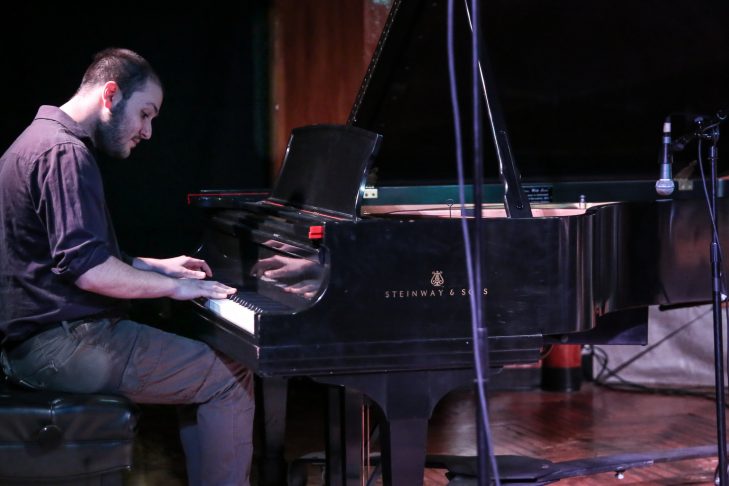Musician and composer Josh Harlow recently recalled that every year at the seder table his family sings the same songs—songs that his great-grandfather Cantor David Chasman brought with him from a small village in Ukraine to a Boston suburb. “These are the songs of his youth, and my family has sung them all my life,” Harlow recently told JewishBoston. (In the interest of full disclosure, I’ve known Harlow since he was in kindergarten and have watched him grow as a musician for two decades.)
The Newton native—Harlow graduated from Solomon Schechter Day School and Newton South High School before majoring in music at Oberlin College—said that as far as he knew, only his family sang these particular melodies at the seder. He added that his grandmother, Navah Harlow, still has a few pieces of her father’s original sheet music.
In a piece the elder Harlow published last year in The New York Jewish Week, she wrote:
…I asked my father about the origin of our song, “Adir Yivneh Regaleinu.” These first three words of the song are difficult to translate. They petition God to enhance the celebration of our festivals. No other family we knew sang this song. In a letter to me, he described how, back in the old country, he and his childhood friends gathered in the courtyard of the beit midrash before mincha on Simchat Torah and were led in the singing of our song by Mordechai Shlomo, a great Tolner chasid, who by that time was slightly tipsy. “He sang and danced with such vigor and enthusiasm that only a chasid of his kind could perform such a dance,” my father wrote. “Since that time, more than half a century has passed. My beloved Monastryschte, and many other Jewish cities and towns, where in each of them we could find many Mordechai Shlomos, were wiped off the surface of the earth by the Nazi killers. But ‘Adir Yivneh Regaleinu’ is still alive and will live forever.”
Josh Harlow moved forward with his great-grandfather’s legacy and created a musical hybrid that in part owes a debt to jazz. “What characterizes my music is a dedication to texture, and there are some parts of the music that are completely improvised,” he said. “Other parts are structured in unconventional ways based on grids and patterns.”
After college, Harlow, who is now based in Chicago, moved to Michigan to pursue music full-time. When he told Jon Taylor, a close friend in Michigan, about his idea to arrange his great-grandfather’s original tunes of Dayenu, parts of the Hallel prayer and Adir Yivneh Regaleinu, the two young men soon discovered they shared similar Jewish musical histories. Taylor—a drummer and frequent collaborator of Harlow’s—had also sung tunes at his family seder that originated in their ancestral village in Ukraine.
This bit of serendipity gave rise to Teiku, a musical group that includes Harlow and Taylor. In the creative mix is John Lindberg, whom Harlow admires as “a legendary elder statesman bassist.”
Teiku takes its name from the Hebrew, which means “unanswered questions.” Harlow said the goal of the group is “to document, perform and breathe new life into these beautiful old melodies. Teiku sets these melodies in a creative music context, balancing carefully set parameters and free improvisation.”
In an email, Harlow added: “The excitement of improvisation lies in its uncertainty and potential for infinite possibilities, and the name itself refers to the collective feeling of discovery that improvising musicians know well: creating cohesive textural environments in real time that are felt so viscerally but cannot be expressed with words. They aim to situate traditional cultural melodies and traditional spirituality in a forward-looking context, to blend conscious cultivated practice with a larger collective cultural unconscious.”
Teiku is on a seven-city tour that will bring the group to Brandeis University on April 1. “I’m excited to play this music for the community in which I grew up,” Harlow said. “It makes a lot of sense to me to present it and share how central it has been to my artistic practice. This music is culturally rooted in me.”
Find more information about Teiku’s performance at Brandeis University here.



